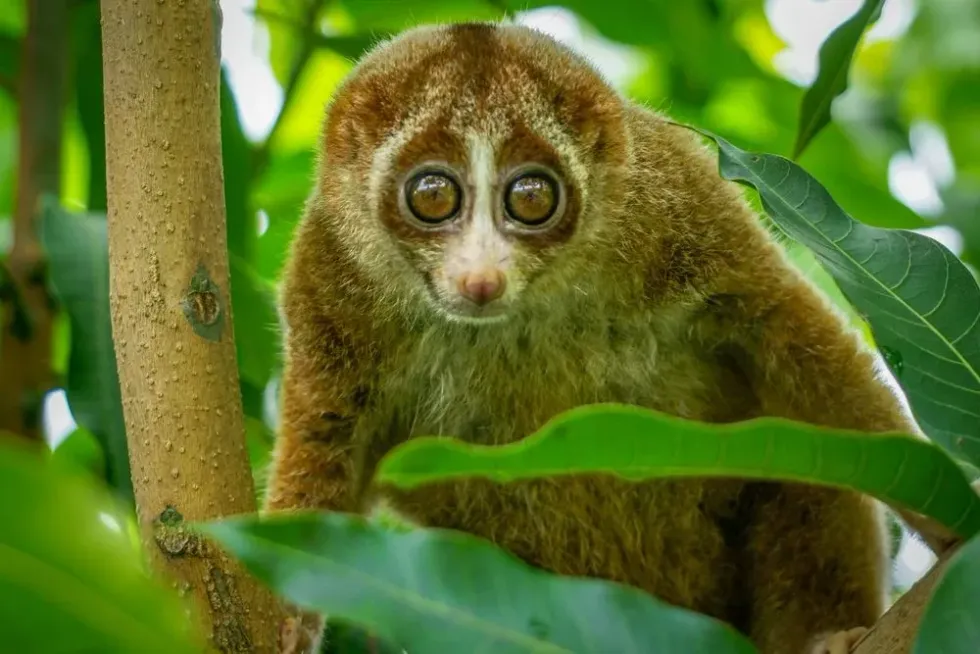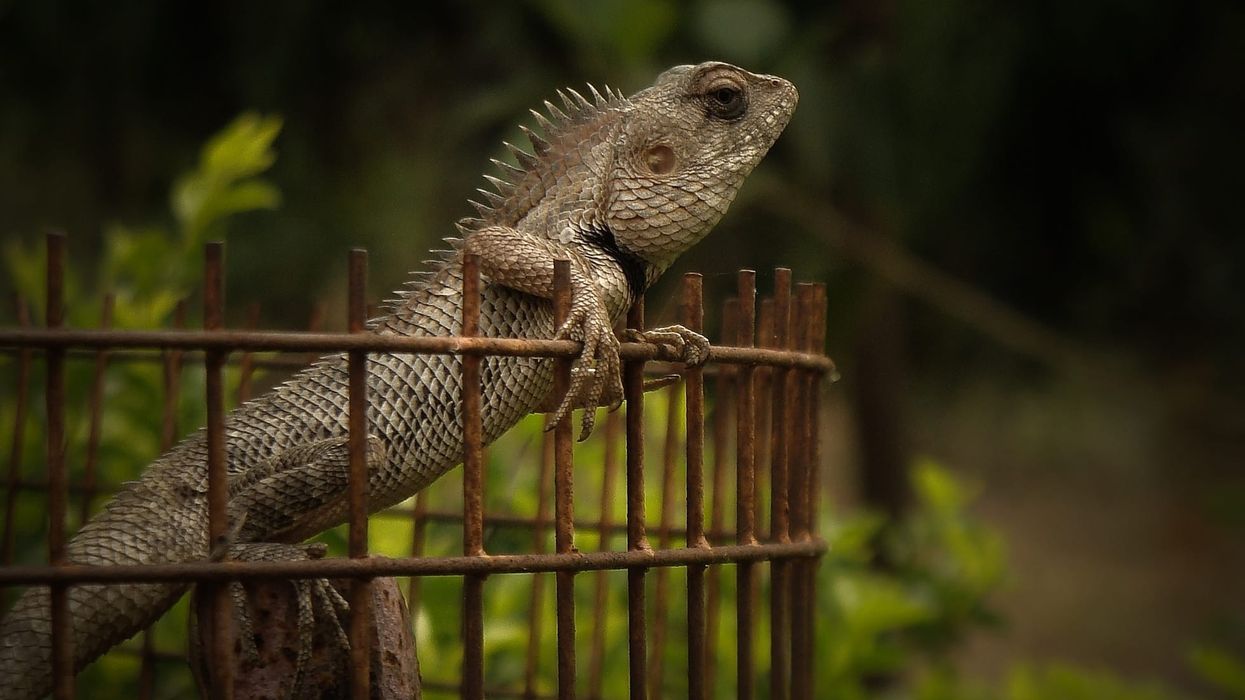Is your child's animal of choice this week the monkey? If so, then these fun facts about Pygmy Slow Loris are a great start to satisfy their curiosity.
With their scientific name being Nycticebus Pygmaeus, they are a species of lemur that is protected under the Species Survival Plan. The Species Survival Plan aims to protect endangered species like this one.
They have 50 such animals in their facility, though they advise against others adopting them as pets because they are not meant to be in captivity.
The Duke Lemur Center also used to house these rare creatures, but as of 2019, they returned all of them back to the wild. This species of Slow Pygmy Loris is naturally found in Vietnam, Laos, Cambodia, and neighboring regions.
If you are interested in the Pygmy Slow Loris, then you should absolutely read about patas monkey and squirrel monkeys too!
Pygmy Slow Loris Interesting Facts
What type of animal is a Pygmy Slow Loris?
The Pygmy Slow Loris is a lemur.
What class of animal does a Pygmy Slow Loris belong to?
The Pygmy Slow Loris, much like other monkeys and lemurs, is a mammal.
How many Pygmy Slow Lorises are there in the world?
There are about 150 in captivity (for research purposes), and an unknown number in the wild.
Where does a Pygmy Slow Loris live?
The Pygmy Slow Loris lives in the evergreen and tropical rainforests on the east of the Mekong River.
What is a Pygmy Slow Loris' habitat?
The Pygmy Slow Loris is best suited to live in a tropical rainforest.
Who do Pygmy Slow Lorises live with?
Unlike many other monkey and lemur species, the Pygmy Slow Loris prefers to live on their own.
How long does a Pygmy Slow Loris live?
With a relatively long life span, the Pygmy Slow Loris can live for up to 20 years in the wild.
How do they reproduce?
Like all other mammals, they reproduce by mating once a year.
What is their conservation status?
According to the IUCN Red List, the Pygmy Slow Loris is Endangered.
Pygmy Slow Loris Fun Facts
What do Pygmy Slow Lorises look like?
The Pygmy Slow Loris is a very small animal. Their most distinctive feature is their large, beady eyes on a small, round head.
Their bodies are very lithe, with slender limbs and curved arms to help them hang off of trees. Their coat is usually red-brown in color, though this can change to either shade as per their diet and the season. They also have a very flexible, almost twisting torso that lets them move around and eat with ease.
How cute are they?
Oh, trust us, you do not want to get close enough to a Pygmy Slow Loris to determine if they are cute or not. With their beady eyes, reddish-brown and matted fur, and general lethargy, we would say that the Pygmy Slow Loris is not a very cute or adorable animal.
How do they communicate?
Since they are fairly solitary animals, they rarely communicate with one another. But if they have to, they use two methods. One is by calls and long, extended sounds, and the other is through marking their territories with scent.
How big is a Pygmy Slow Loris?
They can be from 15-25 cm in length - as big as a coke can. This is also pretty little compared to other species that can be bigger in size than the Pygmy Slow Loris. That is also why they are named the 'Pygmy' Slow Loris, where 'Pygmy' means small.
How fast can a Pygmy Slow Loris run?
The name is Pygmy 'Slow' Loris. We suppose that would not make them very fast runners. Or runners at all. Or even walkers. The Pygmy Slow Loris then moves too slowly to be noticeable on any speed scale.
How much does a Pygmy Slow Loris weigh?
A Pygmy Slow Loris weighs 420 g - that's almost a pound. They'd be a perfect fit in your palm, though we highly discourage holding them, or even interacting with them at all. They are poisonous and have been known to kill humans in the past.
What are their male and female names of the species?
There is so little research into the Pygmy Slow Loris that not even the scientists know how many are there! As such, there is no specific name for either sex of this species.
What would you call a baby Pygmy Slow Loris?
The Pygmy Slow Loris baby is referred to as such. There is very little research into these animals, so there was no reason to name them. But did you know these babies take advantage of their mother's lactation period? It lasts about 150 days, after which these babies pursue their own lives.
What do they eat?
Most commonly, they forage for food and eat leaves and fruits off branches and shrubs. But is that all? Not at all!
Pygmy Slow Lorises also enjoy eating insects. Ants, in particular, are definitely their favorite.
They are also one of the gummivores which means that they survive off tree sap and tree gum. This is very useful if they are ever stuck in food shortages with not enough leaves and insects around.
In addition, they also have specialized jaws which help them extract tree sap from barks and keep them full in times of crisis.
Are they poisonous?
The Pygmy Slow Loris are poisonous indeed. In fact, their venom has been known to kill humans on several occasions so that we could give them a wide berth all around. They produce toxins from their elbows with which they poison their teeth.
But the fun part is that the poison isn't actually activated until it reacts with their saliva! Crazy stuff, right? We think so too, but only as long as our encounters with this endangered species stay over the internet.
Would they make a good pet?
Pygmy Slow Loris - pets? Nope. Never. Not at all.
Not only is a Pygmy Slow Loris very poisonous to human beings, but they are also endangered, meaning that owning one as a pet is illegal in many countries. Also, they are kind of ugly, so would they make good pets at all?
We don't think so. Consider adopting a dog or a cat instead - they will love you for it!
Did you know...
Usually found in Vietnam, Laos, and other Eastern countries, the female Pygmy Slow Lorises have a gestation period of 184–200 days, which is just a little less than what a human does.
They give birth after this period and the youngest ever female Loris who had to give birth is as young as 16 months of age!
Several females and males of this species and the lesser slow Loris are protected under the Species Survival Plan. In addition, there is so little information about them that scientists do not even know the exact number of creatures out in the wild.
Though there have been great attempts to research about them, their declining habitat in Vietnam and Laos has led to their decreased population.
How dangerous are the Pygmy Slow Lorises?
The Pygmy Slow Loris Nycticebus Pygmaeus are very, very dangerous indeed. Though there is little known about their encounters with humans, we can safely say that many humans have been paralyzed, blinded, gone into shock, and even died thanks to these little Pygmy Lorises.
In addition, there are almost no recorded cases of humans recovering from a Pygmy Loris attack. So if you are walking through a Cambodian forest and see one of the Pygmy Lorises, let's turn around and walk away, ok?
Does anyone keep Pygmy Slow Lorises as pets?
Many people try to, but very few actually succeed, and all those who do, aren't actually doing it legally. The Pygmy Slow Loris is on the IUCN Red List which means its survival is in danger.
In addition, it is illegally used in the pet trade and traditional medicine across parts of China and other Asian countries even though there is no actual scientific basis for this.
Therefore, because of its illegal use in traditional medicine and pet trade, it is illegal in most countries of the world to actually keep one as a pet.
So it is not a good idea to adopt anyone of this species because of various reasons. You would be better off adopting a friendlier creature instead.
Here at Kidadl, we have carefully created lots of interesting family-friendly animal facts for everyone to discover! Learn more about some other mammals, including vervet monkey or New World monkeys.
You can even occupy yourself at home by drawing one on our Pygmy Slow Loris coloring pages.









